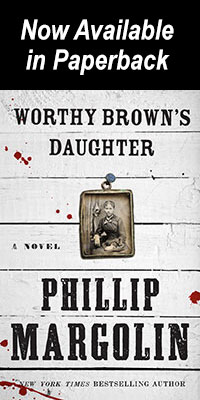Top of Page | Reviews | Historical Note
Worthy Brown's Daughter - 2014
 Known for his critically acclaimed contemporary thrillers, New York Times bestselling author Phillip Margolin explores intriguing new territory in Worthy Brown's Daughter, a compelling historical drama, set in nineteenth-century Oregon, that combines a heartbreaking story of slavery and murder with classic Margolin plot twists.
Known for his critically acclaimed contemporary thrillers, New York Times bestselling author Phillip Margolin explores intriguing new territory in Worthy Brown's Daughter, a compelling historical drama, set in nineteenth-century Oregon, that combines a heartbreaking story of slavery and murder with classic Margolin plot twists.
One of a handful of lawyers in the new state of Oregon, recently widowed Matthew Penny agrees to help Worthy Brown, a newly freed slave, rescue his fifteen year old daughter, Roxanne, from their former master, a powerful Portland lawyer. Worthy's lawsuit sets in motion events that lead to Worthy's arrest for murder and create an agonizing moral dilemma that could send either Worthy or Matthew to the hangman.
At the same time, hanging judge Jed Tyler, a powerful politician with a barren personal life, becomes infatuated with a beautiful gold-digger who is scheming to murder Benjamin Gillette, Oregon's wealthiest businessman. When Gillette appears to die from natural causes, Sharon Hill produces a forged contract of marriage and Tyler must decide if he will sacrifice his reputation to defend that of the woman who inspired his irrational obsession.
At Worthy's trial, Matthew saves Worthy by producing a stunning courtroom surprise and his attempt to stop the deadly fortune hunter ends in a violent climax.
Top of Page | Reviews | Historical Note
“Legal thriller writer Margolin (Sleight of Hand, 2013, etc.) turns back the clock to confront murder, deceit and slavery in frontier Oregon. . .. . Margolin shines in recreating pioneer life .. . . there’s legal wrangling, murder and romance, set against the backdrop of race and frontier life. . . . his scene-setting, knowledge of the frontier and relating of the hard task of the law make for an appealing read.”
―Kirkus Reviews
“It’s hardly surprising that Margolin’s latest work wraps with a huge courtroom scene, but what intrigues here is the setting. Best-selling thriller author Margolin has forsaken the modern world for 19th-century Oregon, where lawyer Matthew Penny agrees to help freed slave Worthy Brown retrieve his daughter from their former master, a big-time Portland lawyer. Tragically, his efforts lead to Worthy’s arrest for murder. Meanwhile, ice-cold hanging judge Jed Tyler has fallen for a gorgeous woman with money in her sights and murder in her heart. Based on a real case, which should bring out the best in former criminal defense attorney Margolin.”
— Library Journal
“Margolin establishes characters that might have stepped out of a grainy Western . . . [and] allows passions to sway his heroes, and generates empathy toward his crooks . . . on the courtroom floor, where Margolin is clearly at home, the stock characters adopt roles, albeit briefly, in a satisfying, white-knuckle climax.”
— Publishers Weekly
“Throw in a money-grubbing beauty, a smitten judge, a few loudmouth hotheads, and at least two legal beagles willing to bend the law, and the Old West comes alive in heart-wrenching, violent, and wicked racist color. . . .. Legal thriller and western fans will stay with it to the last page. Both a psychological western reminiscent of The Ox-Bow Incident and a sharp critique of Oregon’s early legal process, Margolin’s novel offers a compelling portrait of small town justice done right.”
―Booklist
Top of Page | Reviews | Historical Note
HISTORICAL NOTE FOR WORTHY BROWN’S DAUGHTER
I started practicing criminal defense in 1972. I was 28 years old. “Heartstone,” my first novel, was published in 1978 and “The Last Innocent Man,” my second novel, was published in 1981. 1978 was also the year I argued at the United States Supreme Court and between the publication of the two novels my law practice changed and I started handling murder cases and other major felonies. Criminal defense had always been my passion so I decided to put my writing career on hold and concentrate on my legal career.
Sometime in the early 1980s I read an article by Scott McArthur that the Oregon Historical Society published in August, 1970 about Holmes v. Ford. The facts of the case were heartbreaking. Polly and Robin Holmes and the Holmes children were slaves in Missouri. In 1844, Colonel Nathaniel Ford brought his slaves to the Oregon Territory. He promised to free the family when they reached the Willamette Valley if they helped him establish a farm. Ford reneged on his promise but freed Robin, Polly and a newborn child after Robin worked in the gold fields with Ford’s son for a year. Ford refused to free the couples four other children. When one of the children died two years later Robin Holmes turned to the law.
Winning this case was no mean feat. Oregon was hostile to Blacks in the 1800s. Article I, Section 35 of the Oregon Constitution held that “No free negro or mulatto, not residing in the State at the time of the adoption of this Constitution, shall come, reside, or be within this State, or hold real estate, or make any contracts, or maintain any suit therein.” But, in 1854, George Henry Williams, the Chief Justice of the Oregon Supreme Court, had the courage to grant a writ of habeas corpus and the family was reunited.
I was so inspired by this story that I began thinking about writing a novel loosely based on it. As I was researching Oregon history for background I ran across the memoir of Stephen J. Field, one of America’s most interesting citizens. Field, who was appointed by Abraham Lincoln, was the first United States Supreme Court justice from the west, the longest serving until William O. Douglas and the only Supreme Court justice to be arrested for murder while sitting on the court.
It took me many years to write my first draft of a novel about Matthew Penny, a young lawyer who tries to get ex-slave Worthy Brown’s young daughter, Roxanne Brown, away from their former owner, who has freed him but is keeping her in servitude. Matthew’s wife died on the Oregon Trail and he is still grieving. He wants to reunite Roxanne with her father to save Worthy from the pain he felt when death separated him from his wife. Jedidiah Tyler, an Oregon Supreme Court Justice, loosely based on Stephen J. Field, plays a major role in the story.
In order to write the book I had to learn what it would have been like to practice law in Oregon in 1860. I was surprised to learn that there were no courthouses in the state and trials might be held in a field in summer or a tavern in winter. Judges, lawyers and litigants rode from town to town. A judge had to be wise but he also had to be tough enough to brave the elements, deal with wild animals and other dangers and a lawyer had to know how to research the law and how to shoot a gun. Accommodations were scarce and the parties often shared beds in one room cabins with families who would put them up for a fee. Writing “Worthy Brown’s Daughter” became a hobby and I worked on it on and off while I concentrated on my busy law practice.
In 1991, a conversation at a dinner party inspired me to write “Gone But Not Forgotten.” “Gone” launched my career as a writer of bestselling thrillers so I put “Worthy Brown’s Daughter” away while I concentrated on writing novels about lawyers and murders in modern day America.
In 2011, I finished a novel way ahead of deadline and started thinking about ideas for my next book. I loved my historical novel and felt it was the best thing I’d ever written but events had kept me from her for many years. I took “Worthy Brown’s Daughter” out of mothballs, reread it, rewrote it and sent it to Jean Naggar and Jennifer Weltz, my agents.
In the summer of 2011 I came to New York to speak and teach at the International Thriller Writer’s Convention. My editor at HarperCollins had moved to another house and I had not met Claire Wachtel, my new editor, so we agreed to meet for breakfast to discuss Capitol Murder, the book she was editing for me. Shortly before our meeting, I spoke with Jean and she said something that made my heart soar: “When you meet with Claire, tell her I’m going to be sending her an historical novel you’ve written.” I was so happy. After almost thirty years, I had finally gotten the book right. A few weeks later, Jean called to say that HarperCollins was going to publish my book.










